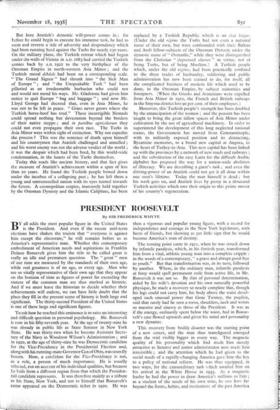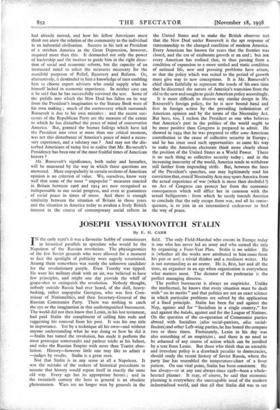PRESIDENT ROOSEVELT
By SIR FREDERICK WHYTE
BY all odds the most popular figure in the United States is the President. And even if the recent mid-term elections have shaken the truism that " everyone is against him except the electorate," he still remains before us as America's representative man. Whether this contemporary embodiment of American needs and aspirations in Franklin Delano Roosevelt gives him the title to be called great is really an idle and premature question. The " great " men of our time are measured by the standards of their own age, while real greatness is of no age, or every age. Men who are so vitally representative of their own age that they appear on the horizon of time as figures of power far exceeding the stature of the common man are thus marked as historic. And if we must leave the historian to decide whether their achievements will endure, we can have little doubt that the place they fill in the present scene of history is both large and significant. The thirty-second President of the United States is one of these large and significant figures.
To ask how he reached this eminence is to raise an interesting and difficult question in personal psychology. Mr. Roosevelt is now in his fifty-seventh year. At the age of twenty-nine he was already in public life as State Senator in New York State. He was thirty-two when he became Assistant Secre- tary of the Navy in Woodrow Wilson's Administration ; and in 192o, at the age of thirty-nine he was Democratic candidate for the Vice-Presidency in the Presidential Election and, along with his running-mate Governor Cox of Ohio, was soundly beaten. Now, a candidate for the Vice-Presidency is not, as a rule, a person of much importance. He is usually selected, not on acccunt of his individual qualities, but because he hails from a different region from that which the Presiden- tial candidate represents. It was therefore mainly as a tribute to his State, New York, and not to himself that Roosevelt's name appeared on the Democratic ticket in 192o. He was then a vigorous and popular young figure, with a record for independence and courage in the New York legislature, with hosts of friends, but showing as yet little sign that he would become America's man of destiny.
The turning point came in 1921, when he was struck down by infantile paralysis, which, in his fortieth year, transformed him from a vital, athletic young man into a complete cripple : in the words of a contemporary, " a grave and abrupt good-bye to youth." But that transformation was, in its turn, followed by another. Where, in the ordinary man, infantile paralysis at forty would spell permanent exile from active life, in Mr. Roosevelt it was not so. By dint of personal determination, aided by his wife's devotion and his own naturally powerful physique, he made a recovery so nearly complete that, though his legs could not carry him, his body above the waist devel- oped such unusual power that Gene Tunney, the pugilist, said that rarely had he seen a torso, shoulders, neck and wrists so massive and sinewy as those of the President. It was as if the energy, ordinarily spent below the waist, had in Roose- velt's case flowed upwards and given his mind and personality a new dynamic.
This recovery from bodily disaster was the starting point of a new career, and the man thus transfigured emerged from the trial visibly bigger in every way. The magnetic quality of his personality which had made him merely attractive as Senator and junior administrator now made him irresistible ; and the attention which he had given to the social needs of a rapidly-changing America gave him the key to a policy of national reform. He was thus equipped, in two ways, for the extraordinary task which awaited him on his arrival in the White House in 1933. As a magnetic leader he had the power to draw America's millions to him ; as a student of the needs of his own time, he saw how far beyond the forms, habits, and institutions of the past America had already moved, and how his fellow Americans must think out anew the relation of the community to the individual in an industrial civilisation. Success in his task as President of a stricken America in the Great Depression, however, required more than this. It demanded not only the power of leadership and the instinct to guide him in the right direc- tion of social and economic reform, but the capacity of an instructed mind to select the measures necessary for the manifold purposes of Relief, Recovery and Reform. Or, alternatively, it demlnded in him a knowledge of men enabling him to choose expert advisers who could supply what he himself lacked in economic experience. In neither case can it be said that he has successfully survived the test. Some of the pitfalls into which the New Deal has fallen on its way from the President's imagination to the Statute Book were of his own making ; much of the controversy which surrounds Roosevelt is due to his own mistakes : and the recent suc- cesses of the Republican Party are the measure of the extent to which he has disturbed the peace of mind of conservative America. But, granted the human failings which have led the President into error at more than one critical moment, was not this disturbance of America's peace of mind a neces- sary experience, and a salutary one ? And may not the dis- turbed Americans of today live to realise that Mr. Roosevelt's Presidency has been one of the most fruitful times of American history ?
' Mr. Roosevelt's significance, both today and hereafter, will be measured by the way in which these questions are answered. Mere unpopularity in certain sections of American opinion is no criterion of value. We, ourselves, know very well that some of the most " unpopular " measures enacted in Britain between 1906 and 1914 are now recognised as indispensable to our social progress, and even as guarantees of social peace in times of stress. And there is enough similarity between the situation of Britain in those years and the situation in America today to awaken a lively British interest in the course of contemporary social reform in. the United States and to make the British observer reel that the New Deal under Roosevelt is the apt response of statesmanship to the changed condition of modem America. Every American has known for years that the frontier was closed, and the era of exuberant growth at an end ; but not every American has realised that, in thus passing from a condition of expansion to a more settled and static condition of national life, new and pressing problems have arisen, or that the policy which was suited to the period of growth must give way to new conceptions. It is Mr. Roosevelt's chief claim faithfully to represent the needs of his own time that he discerned the nature of America's transition from the old to the new and sought to guide American policy accordingly.
It is more difficult to discern any similar design in Mr. Roosevelt's foreign policy, for he is now bound hand and foot in foreign action by the prevailing isolationism of American opinion and by the terms of the Neutrality Act. But here, too, I reckon the President as one who believes that America's part in the politics of the world ought to be more positive than Congress is prepared to admit. He showed in 1934 that he was prepared to offer some American contribution to the cause of collective security in Europe ; and he has since used such opportunities as came his way to make the American electorate think more clearly about the position of the United States as a World Power. There is no such thing as collective security today ; and in the increasing insecurity of the world, America tends to withdraw still farther from impending strife. But, between the lines of the President's speeches, one may legitimately read his conviction that, even if Neutrality Acts may spare America from the actual experience of war (which is more than doubtful !) no Act of Congress can protect her from the economic consequences which will afflict her in common with the actual belligerents : from which he surely intends America to conclude that the only escape from war, and all its conse- quences, is to join in . an international endeavour to find the way of peace.

























































 Previous page
Previous page